CNS’ Young Women in Nonproliferation Initiative was established in 2018 to bring WMD nonproliferation and disarmament issues to more women at US colleges and universities. In addition to maintaining this online resource, CNS also conducts outreach events at colleges and universities across the country and matches undergraduate women who are interested in this field with mentors as part of the Initiative.
The Team
Nomsa Ndongwe
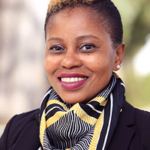
Nomsa Ndongwe
Nomsa Ndongwe is a Research Associate at the James Martin Center for Nonproliferation Studies. She is a Co-founder of the WCAPS West Coast Chapter, and an N-Square Innovators Network Fellow 2020 – 2021. She has a Master of Arts in Nonproliferation, Terrorism Studies and Financial Crime Management from the Middlebury Institute of International Studies. Her areas of research/expertise are: Biological Weapons, International Treaties, Law, Multilateralism, Diplomacy, Non-Aligned Movement, Nuclear Disarmament, Nonproliferation Education, Nonproliferation Treaty, Proliferation Financing, Sanctions.
To learn more about the initiative, email Nomsa at [email protected]
Sophia Poteet
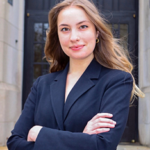
Sophia Poteet
Sophia Poteet is a Program Coordinator and Research Associate at the James Martin Center for Nonproliferation Studies. Her areas of research/expertise include: gender and nonproliferation/disarmament, nonproliferation sanctions, proliferation finance, and international nonproliferation treaties. Previously, she worked with the Small Arms Survey and the Nuclear Sites Project at the Global Decolonization Initiative. She holds a BA in International Relations from Boston University and is a former YWINI mentee.
To learn more about the initiative, email Sophia at [email protected]
Initiative Advisors
The Young Women in Nonproliferation Initiative is advised by an international group of leading experts on WMD nonproliferation, disarmament, and arms control.
Sarah Bidgood

Sarah Bidgood
The Young Women in Nonproliferation Initiative was founded by Sarah Bidgood, former Director of the Eurasia Nonproliferation Program at CNS and current 2023-2024 Stanton Nuclear Security Fellow in the MIT Security Studies Program. Her work focuses on U.S.-Soviet and U.S.-Russian arms control and nonproliferation cooperation, as well as the nonproliferation regime more broadly. Her research and analysis have appeared in journals such as International Security, the Journal for Peace and Nuclear Disarmament, and The Nonproliferation Review, as well as outlets including Foreign Policy, Arms Control Today, War on the Rocks, and The National Interest.
Sarah received her BA in Russian from Wellesley College. She holds an MA in Russian, East European, and Eurasian Studies from the University of North Carolina-Chapel Hill and an MA with distinction in Nonproliferation and Terrorism Studies from the Monterey Institute of International Studies. She is a PhD candidate (ABD) in Defense Studies at King’s College London, where her dissertation focuses on the relationship between Cold War nuclear crises and arms control.
Susan F. Burk
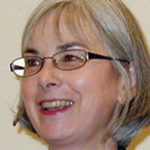
Susan F. Burk
Ambassador Susan F. Burk (ret.) served as the special Representative of the President for Nuclear Nonproliferation from 2009-2012, leading the U.S. preparations for and participation in the successful 2010 Nuclear Nonproliferation Treaty (NPT) Review Conference. Over her more than 35 years of public service focused on United States’ nonproliferation, arms control and counterterrorism objectives, she has held a number of senior positions in both the State Department and the former U.S. Arms Control and Disarmament Agency (ACDA). Ambassador Burk served as Principal Deputy Assistant Secretary of State in the Bureau of Nonproliferation and as Acting Assistant Secretary in the Nonproliferation Bureau for 14 months. She was the first Deputy Coordinator for Homeland Security in the State Department’s Office of the Coordinator for Counterterrorism. At ACDA, she headed the office that led the U.S. preparations for the 1995 NPT Review and Extension Conference. Since her retirement in November 2012, she has served as a consultant on nuclear nonproliferation and NPT issues to the Department of State and the Department of Energy.
Ambassador Burk is a Phi Beta Kappa graduate of Trinity College, Washington, DC. She received her master’s degree from Georgetown University.
Elayne Whyte Gómez

Elayne Whyte Gómez
Ambassador Elayne Whyte Gómez serves as the Permanent Representative of Costa Rica to the United Nations Office in Geneva. She presided over the negotiations of the Treaty on the Prohibition of Nuclear Weapons (TPNW), concluded in 2017. Between 2014 and 2015, she was co-Chair of the 5th Meeting of the States Parties to the Convention on Cluster Munitions (CCM). From 2015 to the present, she has served as the Coordinator on Transparency Measures of the CCM and co-chair of the ad hoc Working Group on Treaty Implementation of the Arms Trade Treaty.
Prior to her appointment to Geneva, Ambassador Whyte Gómez was Chief of Staff in the office of the Minister of Foreign Affairs at the Ministry of Foreign Affairs and Worship in San Jose, Costa Rica from 2009 to 2010. She was also Vice Minister of Foreign Affairs and Worship at the Ministry from 2000 to 2002 and a Policy Advisor to the Minister of Foreign Affairs from 1998 to 2000.
Ambassador Whyte Gómez holds an M.A. in International Policy Studies from the Monterey Institute of International Studies, California, United States. She also has a degree in International Relations from the Autonomous University of Central America, San Jose.
Bonnie Jenkins
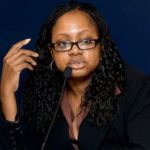
Bonnie Jenkins
Ambassador Bonnie Jenkins is the Under Secretary for Arms Control and International Security. From 2017 until April 2021, she was the Founder, Executive Director, and Board Chair of Women of Color Advancing Peace and Security. She was also a nonresident senior fellow at the Brookings Institution and president of Global Connections Empowering Global Change LLC.
Previously, she was an ambassador at the U.S. Department of State from 2009-2017, where she served as coordinator for threat reduction programs in the Bureau of International Security and Nonproliferation.
Before returning to government in 2009, Ambassador Jenkins served as program officer for U.S. Foreign and Security Policy at the Ford Foundation. She also served as counsel on the National Commission on Terrorist Attacks Upon the United States (9/11 Commission).
Ambassador Jenkins is a retired Naval Reserves officer and holds a doctorate in international relations from the University of Virginia; a Master of Law in international and comparative law from the Georgetown University Law Center; a Master of Public Administration from the State University of New York at Albany; a juris doctor from Albany Law School; and a bachelor’s degree from Amherst College.
Angela Kane
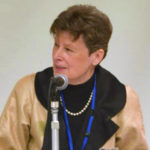
Angela Kane
Angela Kane joined the Vienna Center for Disarmament and Nonproliferation as a Senior Fellow in October 2015. She holds a number of other functions, including Vice President, International Institute for Peace, Vienna; Visiting Professor, Paris School of International Affairs, SciencesPo; Member, United Nations University Council; Member and Co-Chair, Group of Eminent Persons, Comprehensive Test Ban Treaty Organization; Member, Group of Eminent Persons for Substantive Advancement for Nuclear Disarmament appointed by Foreign Minister Kono of Japan; Member, European Leadership Network; and Reserve Member, High-Level Group on Artificial Intelligence of the European AI Alliance, among others.
Ms. Kane served as the United Nations High Representative for Disarmament Affairs until mid-2015. She was responsible for planning, negotiating, and conducting the ground-breaking investigation of alleged chemical weapons use in Syria in 2013, which resulted in Syria’s destruction of its chemical stocks. From 2008-2012, she was the UN Under-Secretary-General for Management. Prior to this, she served as UN Assistant Secretary General for Political Affairs and the Assistant Secretary-General for General Assembly and Conference Management.
Ms. Kane holds degrees from Bryn Mawr College and the John Hopkins School of Advanced International Studies. She received an Honorary Doctorate from the Middlebury Institute of International Studies at Monterey.
Patricia Lewis
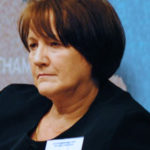
Patricia Lewis
Dr. Patricia Lewis is Research Director for International Security at Chatham House. Previously, she served as Deputy Director and Scientist-in-Residence at the Center for Nonproliferation Studies at the Monterey Institute of International Studies; Director of the UN Institute for Disarmament Research; and Director of the Verification Research, Training and Information Centre in London. She was on Hans Blix’s 2004–2006 WMD Commission; the 2010–2011 Advisory Panel on the future priorities of the Organization for the Prohibition of Chemical Weapons; and was an adviser to the 2008–2010 International Commission on Nuclear Non-proliferation and Disarmament. She received the American Physical Society’s 2009 Joseph A. Burton Forum Award for “outstanding contributions to the public understanding or resolution of issues involving the interface of physics and society.”
Dr. Lewis graduated in Physics from Manchester University and has a PhD in Nuclear Physics from Birmingham University.
Izumi Nakamitsu
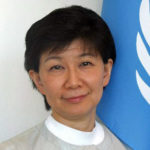
Izumi Nakamitsu
Izumi Nakamitsu is the Under-Secretary-General and High Representative for Disarmament Affairs at the United Nations, a position she assumed on 1 May 2017. Prior to taking on this post, Ms. Nakamitsu had served as Assistant Administrator of the Crisis Response Unit at the United Nations Development Programme (UNDP) since 2014.
Ms. Nakamitsu has many years of experience within and outside the United Nations system, most recently as Special Adviser Ad Interim on Follow-up to the Summit on Addressing Large Movements of Refugees and Migrants between 2016 and 2017. She was previously the Director of the Asia and the Middle East Division of the United Nations Department of Peacekeeping Operations between 2012 and 2014 and served as Director of the Department’s Division of Policy, Evaluation and Training from 2008 to 2012.
Earlier in her career, Ms. Nakamitsu was a member of the United Nations Reform Team of former Secretary-General Kofi Annan. She also held positions with the Office of the United Nations High Commissioner for Refugees (UNHCR), including within the office of Assistant High Commissioner for Policy and Operations Sergio Vieira de Mello, and in UNHCR field operations in the former Yugoslavia, Turkey, and northern Iraq.
Ms. Nakamitsu holds a Master of Science degree in Foreign Service from Georgetown University in Washington, D.C., and a Bachelor of Law degree from Waseda University in Tokyo.
Shorna-Kay Richards
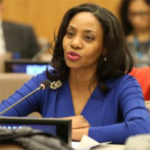
Shorna-Kay Richards
Shorna-Kay Richards is the Ambassador of Jamaica to Japan. Previously, she was the Director of the Bilateral Relations Department in the Ministry of Foreign Affairs and Foreign Trade. Before taking on this role, she served as the Deputy Permanent Representative of Jamaica to the United Nations from September 2012 to July 2016.
During her assignment to the United Nations, Ms. Richards dealt primarily with issues relating to disarmament and international security, the reform of the UN Security Council, and oceans and the law of the sea. She also coordinated Jamaica’s chairmanship of the First Committee during its 69th Session in 2014. In addition, she also worked on strengthening CARICOM’s support for the initiative on the humanitarian consequences of nuclear weapons and represented Jamaica at the second session of the Open-ended Working Group on Taking Forward Multilateral Nuclear Disarmament Negotiations in Geneva in May 2016. She was the Permanent Mission’s UNSC Resolution 1540 focal point on prohibitions related to WMD proliferation, as well.
Ms. Richards received her B.A. from the University of the West Indies, Jamaica and her M.A. in International Policy and Practice from The George Washington University.
Amy Sands
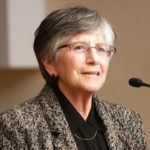
Amy Sands
Dr. Amy Sands most recently served as the executive director for research centers and initiatives at the Middlebury Institute of International Studies at Monterey. Prior to this position, Dr. Sands was provost of the Graduate School of International Policy Studies at MIIS, a post which she held from 2006 to 2014.
Dr. Sands began her career at MIIS in 1996, when she took on the newly created role of deputy director of the James Martin Center for Nonproliferation Studies (CNS). Prior to coming to Monterey, Dr. Sands enjoyed a distinguished career in international security, including senior positions at Lawrence Livermore National Laboratory and the Arms Control and Disarmament Agency. From August 1994 to June 1996, she served as Assistant Director of the Intelligence, Verification, and Information Management Bureau at the U.S. Arms Control and Disarmament Agency (ACDA). Dr. Sands is a member of the Council on Foreign Relations, World Affairs Council of Monterey, and the US Secretary of State’s International Security Advisory Board.
Dr. Sands is a graduate of Tufts University’s Fletcher School of Law and Diplomacy.
Heather Williams

Heather Williams
Dr. Heather Williams is a lecturer in the Defence Studies Department and the Centre for Science and Security Studies (CSSS) at King’s College London. Previously, she was a MacArthur Post-doctoral Fellow in the Department of War Studies at King’s College London, where she also completed her PhD.
Prior to joining King’s as a postdoc, Dr. Williams was a Research Fellow at Chatham House on nuclear weapons policy and worked at the Institute for Defense Analyses in Washington, DC, where she continues to work as an adjunct Research Staff Member.
Her current research focuses on US-Russia arms control and the impact of geostrategic shifts, domestic politics, and changes in leadership. Other policy-relevant issues, include exploring include tailoring assurance to NATO members, the status of the Nuclear Non-Proliferation Treaty (NPT) amid increasing pressure for nuclear disarmament, and competing concepts of strategic stability.
Dr. Williams also holds an M.A. in Security Policy Studies from The George Washington University. She received her B.A. in International Relations and Russian Studies from Boston University.
